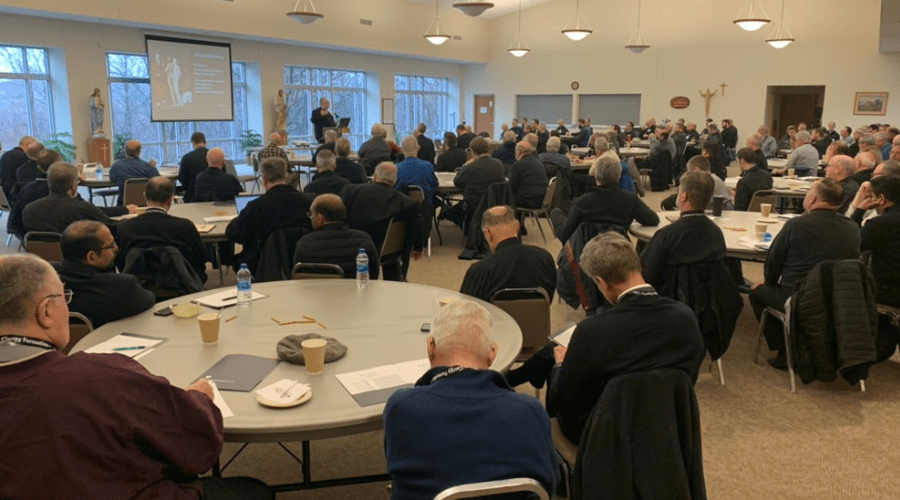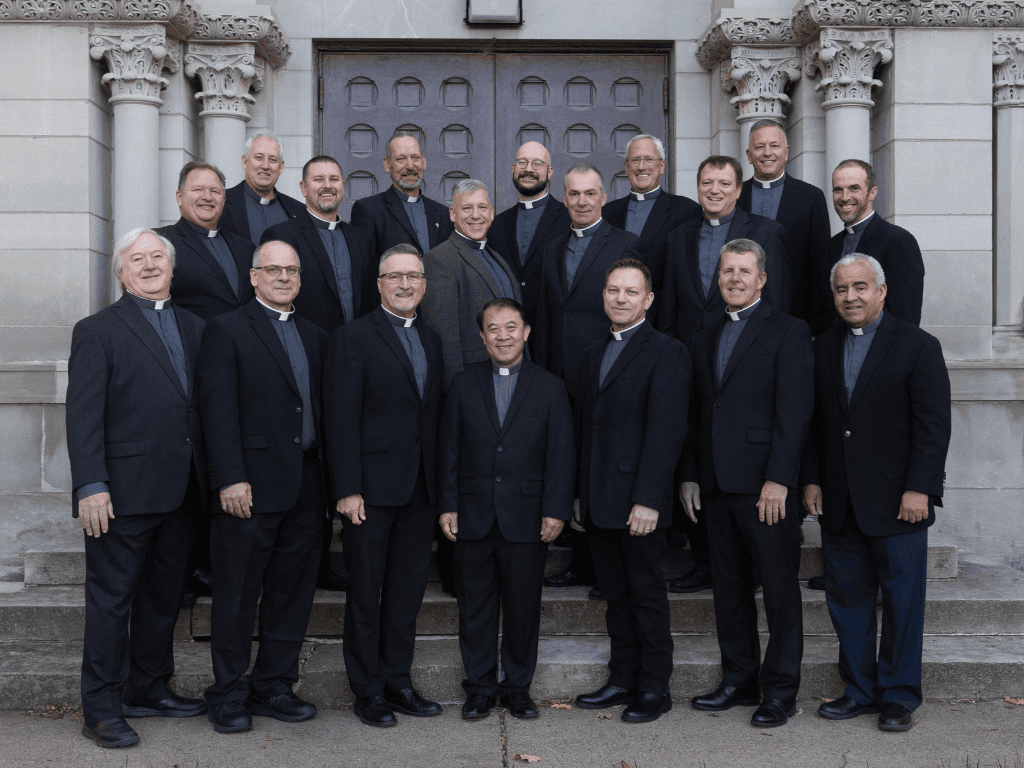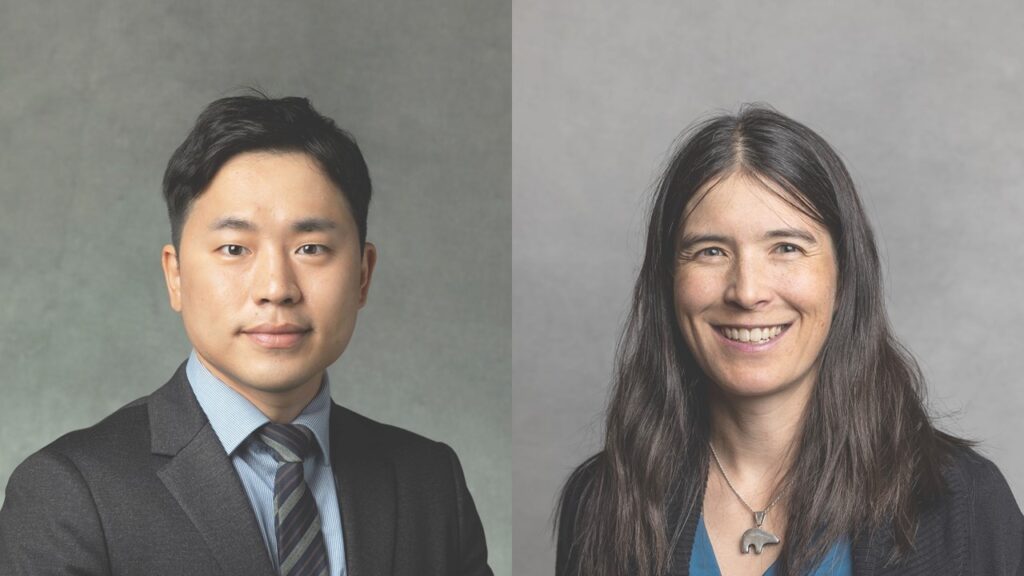From a business standpoint, it makes good sense.
That’s one way Father Peter Williams, pastor of St. Ambrose Catholic Community in Woodbury, Minnesota, explains the value of the Institute for Ongoing Clergy Formation at The Saint Paul Seminary.
“If you look at this from a business perspective, the people of God have invested a lot in every man who’s ordained,” Williams said. “To just send them out and cross our fingers and not provide any support isn’t a sound plan.”
Enter The Saint Paul Seminary’s Institute for Ongoing Clergy Formation, which was founded in 2015 to support priests and deacons in active ministry through a variety of retreats, workshops and counseling services.
“It’s really helpful, because our lives are full,” Williams said. “How do we help priests go from survival mode to flourishing?”
The answer is multifaceted, including year-round opportunities for human, intellectual, spiritual and pastoral formation. The institute averages around 26 opportunities offered to clergy each year. Key areas of ongoing support are retreats for the newly ordained, pastor development, human growth and wellness, homiletics and clergy study days.

“For priests, there is particular need for ongoing formation in parish leadership, management and administration, because many pastors are overwhelmed with unsustainable workloads,” institute Director Deacon Dan Gannon said. “In addition, offering human formation opportunities and support is particularly important to help combat stress and isolation that can arise when priests are overextended.”
A pastor’s role is to empower his staff, Williams said.
“It can be a hard thing to know how to stay at the right altitude and not get in the weeds,” he said. “This is why you have a staff and this is how you form a staff and this is how you support a staff. You’re the link to this [staff member] – let him or her do what they’re good at.”
The annual pastor workshop, a weeklong event for both new and experienced pastors, elicits resoundingly positive feedback. One priest recently told Gannon, “Attending the pastor workshop was an investment in my parish and parishioners. I am already employing the tools to become a more effective pastor, both professionally and spiritually.”
Said Father Rolf Tollefson, pastor of St. Hubert’s in Chanhassen: “Deacon Dan has brought a smorgasbord of options for the enrichment of the intellectual and the spiritual life to the priests and deacons of our archdiocese. Not only has he brought in nationally known speakers, whose orthodoxy is impeccable, but he has also brought in speakers who have brought all of us priests and deacons to conversion.”
A way forward amid the mental health crisis
The impact of the Institute for Ongoing Clergy Formation is expanding, thanks to new grants from Lilly Endowment Inc. and the Haggerty Foundation. They are enabling more support to pastors at schools and a major boost in mental health support.
The grant from Lilly Endowment Inc. was made through the Pathways for Tomorrow Initiative.
There’s a clear need to help pastors at schools given the pressures caused by COVID-19, said Williams, whose parish has a school.
“I think it will be well received,” he said. “The last two years, with COVID, to try to lead in a unified way has been quite painful because of the divisions. I think there’s a weariness that [my brother priests] have felt.”
Priests are also now able to receive counseling from multiple Catholic mental health professionals, including Paul Ruff, assistant director of human formation and director of counseling services at The Saint Paul Seminary. Clergy have a healthy openness about these services, he said.

counseling services at The Saint Paul Seminary
“I always tell priests I see, ‘If you want to come in the back door to not do the long walk down the hall and have a sense of privacy, you can call me when you arrive,’” Ruff said. “They always say, ‘No, it’s good for the seminarians to know I’m coming in here.’ If they ask what they’re here for, they say, ‘Oh, just some mental health stuff with Ruff.’ ‘Oh, great,’ [the seminarians reply].”
A recent study by Endeavor Consulting found that there is roughly one priest for every 1,900 Catholics in the archdiocese. In the same study, 61% of pastors said their mental and emotional health impacted their effectiveness as a shepherd.
Warding off burnout is crucial, Ruff said.
“How do I stand in this vocation in the too much of everything and live it in the way that I just carry the part that’s mine?” Ruff said. “If we try to do it all, we can’t.”
In addition to examining their prayer lives, Ruff prods priests to assess their sleep and dietary habits.
“It’s our dilemma as men – we haven’t been trained to think about the self-care we need and how to take that not as a luxury but as a responsibility. What’s your stewardship, as a resource?”
Getting fresh air can make a big difference, too.
“We live in strange days,” Ruff said. “We live in more and more virtual worlds, and we weren’t meant for a virtual world. COVID exacerbated that.”
The Institute for Ongoing Clergy Formation has been incredibly effective at addressing the many pressures on priests today, Williams said.
“Deacon Dan and Paul Ruff are a great team,” he said. “It’s wonderful to see what they have been able to put in place. It should be a note of pride for the whole Church, all people of God, that we’re caring for our priests and wanting them to grow.”
The institute, in many ways, remains a well-kept secret because its messaging focuses almost exclusively on the clergy it serves. But when lay Catholics learn about its work, they rejoice.
“They are not only relieved and joyfully supportive, but they are also ready to help with their time, talent and treasure,” Gannon said. “We need to take care of those who are giving their lives to care for the people of God.”
Editor's note: A version of this story originally ran on The Seminaries of Saint Paul website. The Saint Paul Seminary is located at the University of St. Thomas.







